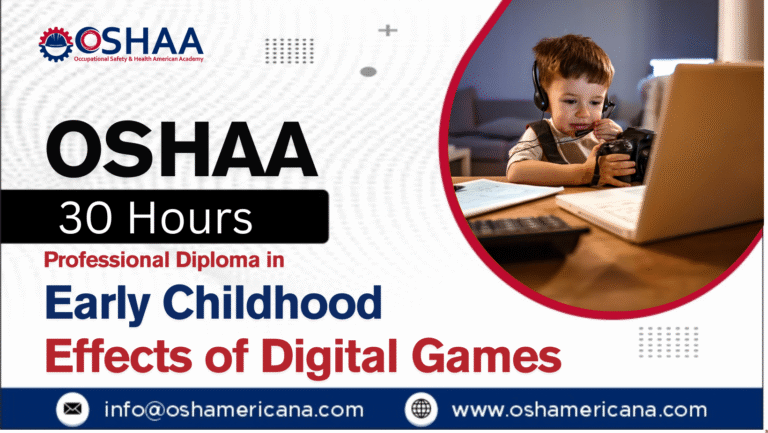Cognitive development in early childhood plays a crucial role in shaping a child’s future learning, behaviour, and overall well-being. For professionals working with young children, understanding the complexities of cognitive development is essential to provide the right support at the right time. The OSHAA 30-Hours Professional Diploma in Cognitive Development in Early Childhood offers a comprehensive curriculum that empowers educators, childcare providers, and early childhood professionals with the knowledge and skills to support children’s cognitive growth effectively.
Cognitive development refers to the process by which children acquire the ability to think, learn, and understand the world around them. It involves the development of skills such as problem-solving, memory, language, and reasoning. Early childhood is a critical period for cognitive development, as the brain is highly plastic and capable of rapid growth and adaptation. A solid foundation in cognitive development during this period can set the stage for future academic success and emotional well-being.
The OSHAA 30-Hours Professional Diploma in Cognitive Development in Early Childhood is a valuable qualification for anyone working with young children. Whether you’re an educator, therapist, or parent, understanding cognitive development is key to supporting children’s growth and helping them reach their full potential. By completing this course, you will be equipped with the knowledge and practical skills to enhance your practice and positively impact the lives of children during their formative years.
OSHAA 30-Hours Professional Diploma in Cognitive Development in Early Childhood
Study Units
Learning Outcomes
Introduction to Cognitive Development in Early Childhood (3 hours)
- Understand the basic concepts of cognitive development in early childhood.
- Recognise the importance of cognitive development during the early years.
- Identify the stages of cognitive development and their impact on learning and behaviour.
- Appreciate the role of early childhood education in promoting cognitive growth.
Stages of Cognitive Development in Young Children (4 hours)
- Learn the key stages of cognitive development in children from birth to school age.
- Identify developmental milestones and typical cognitive abilities at each stage.
- Understand Piaget’s stages of cognitive development and their relevance to early childhood education.
- Analyse how cognitive development progresses in different domains, including problem-solving and reasoning.
Factors Influencing Cognitive Development (4 hours)
- Recognise the internal and external factors that impact cognitive development in young children.
- Understand the role of genetics, environment, and experiences in shaping cognitive abilities.
- Explore the impact of socioeconomic status, family dynamics, and cultural factors on cognitive development.
- Analyse how early childhood environments can enhance or hinder cognitive growth.
The Role of Play in Cognitive Development (4 hours)
- Understand the connection between play and cognitive development in young children.
- Explore different types of play and their impact on intellectual skills such as creativity and problem-solving.
- Learn how to facilitate play-based learning to support cognitive growth.
- Understand the role of pretend play and its link to cognitive development.
Language Development and Cognitive Skills (4 hours)
- Understand the relationship between language development and cognitive growth.
- Learn how language acquisition supports cognitive abilities like memory and problem-solving.
- Explore strategies to support language development through everyday interactions.
- Examine the impact of bilingualism and multilingualism on cognitive skills.
Memory, Attention, and Problem-Solving in Young Children (5 hours)
- Explore the development of memory and attention in young children.
- Learn how children’s attention spans evolve and how it affects their learning.
- Understand the role of working memory and long-term memory in cognitive development.
- Develop strategies to enhance problem-solving skills in young children.
Promoting Cognitive Skills Through Classroom Activities (3 hours)
- Learn how to design classroom activities that promote cognitive development.
- Understand the role of hands-on, interactive learning experiences in boosting cognitive skills.
- Identify activities that support memory, attention, and problem-solving abilities.
- Explore how to integrate cognitive skill development into daily routines.
Supporting Children with Cognitive Delays or Learning Disabilities (3 hours)
- Recognise the signs of cognitive delays and learning disabilities in young children.
- Learn strategies for providing tailored support for children with cognitive challenges.
- Understand how to create inclusive learning environments for children with diverse cognitive needs.
- Explore the role of early intervention in supporting children with cognitive delays.
- Comprehensive Understanding of Cognitive Development
Participants will gain a deep understanding of how cognitive development unfolds in early childhood. This knowledge equips educators, caregivers, and professionals with the tools to foster a child’s intellectual growth from birth through early schooling. - Evidence-Based Techniques for Enhancing Learning
The course introduces research-backed methods for enhancing children’s cognitive skills. Participants will be able to implement practical strategies in their classrooms or practice that promote memory, problem-solving, and attention in children. - Support for Diverse Learning Needs
Learn how to identify and support children with cognitive delays or learning disabilities. The course offers guidance on creating inclusive environments that address a wide range of developmental needs, ensuring all children can thrive. - Practical Applications for Play-Based Learning
Participants will understand the vital role of play in cognitive development. They will gain the expertise to design and implement play-based activities that stimulate learning, creativity, and problem-solving in young children. - Professional Growth in Early Childhood Education
This diploma provides a competitive edge for professionals in early childhood education. Gaining specialised knowledge in cognitive development can open new career opportunities or enhance existing roles, such as teaching, daycare management, or educational consulting. - Improved Communication Skills with Children
By exploring the link between language development and cognitive skills, participants will learn effective communication strategies that foster children’s cognitive abilities and build stronger educational rapport. - Increased Confidence in Assessing Developmental Milestones
Participants will be equipped to assess cognitive milestones in early childhood development accurately. They will be able to identify potential delays and intervene early, ensuring that children receive the support they need for optimal development. - Holistic Understanding of Child Development
The course offers a well-rounded view of how cognitive, emotional, and social development are interconnected. This holistic approach enhances educators’ ability to support children’s overall well-being. - Enhanced Parental Support Strategies
The course empowers professionals to work with parents and caregivers in understanding cognitive development. Participants will gain the knowledge to provide valuable insights and advice on how to support cognitive growth at home. - Stay Ahead of Emerging Trends in Early Childhood Education
By studying the latest research in cognitive development, participants stay up-to-date with new trends and approaches in early childhood education, ensuring they are always at the forefront of best practices.
- Early Childhood Educators and Teachers
This course is ideal for early childhood educators who wish to deepen their understanding of cognitive development and apply it in their classrooms. It equips teachers with the knowledge and skills to support children’s intellectual growth effectively. - Childcare Providers and Practitioners
Childcare providers, including nursery staff and daycare professionals, will benefit from this course by learning how to foster cognitive development through daily interactions and structured activities with young children. - Parents and Caregivers
Parents and caregivers seeking to understand cognitive development better will find this course helpful. It provides practical insights into how to support children’s learning and development at home, complementing formal education. - Child Psychologists and Therapists
Professionals working in child psychology and therapy will benefit from a deeper understanding of cognitive development in early childhood. This knowledge can support therapeutic practices and interventions with children experiencing developmental challenges. - Special Education Teachers
Special education professionals who work with children with learning disabilities or developmental delays will gain valuable insights into cognitive development. The course will help them tailor educational approaches to the unique needs of their students. - Speech and Language Therapists
Speech and language therapists can enhance their practice by understanding how cognitive and language development are intertwined. This course supports them in creating targeted interventions for children with speech and language delays. - Healthcare Professionals in Paediatric Care
Nurses, paediatricians, and healthcare workers who interact with children will find this course beneficial for understanding the cognitive milestones and early signs of developmental delays, enabling them to offer informed guidance to families. - Education Administrators and Leaders
School administrators, education consultants, and leaders involved in early childhood programmes will benefit from this course as it enhances their understanding of cognitive development trends, helping them implement effective educational strategies at an organisational level. - Individuals Seeking a Career in Early Childhood Education
Those new to the field or considering a career in early childhood education will gain foundational knowledge on cognitive development, setting them on a path to becoming informed, effective practitioners.







